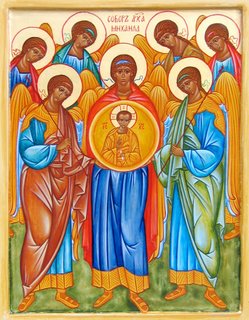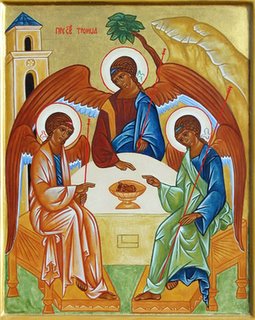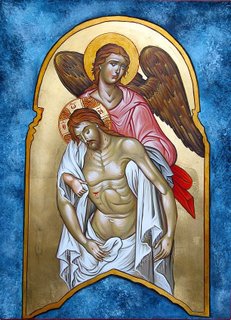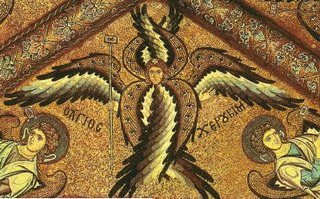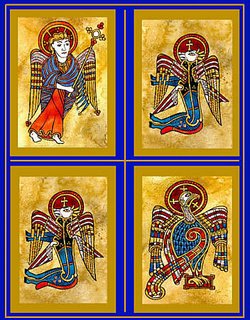Friday, September 29, 2006
Another Year for Thanksgiving to God for a Great Life.
My Lord and my God, in You alone I live and move and have my being. Today I again mark the day of my birth and the beginning of my temporal life. In deep gratitude I also recall my spiritual birth in the waters of Holy Baptism as You reconciled me to Yourself and cleansed me of my sin. For all this I thank and praise You. This day reminds me, to Your praise, O God, my Creator, that I was not only born into this world, but also that You have bought me to a place where Your name is truly known, Your Word is taught in purity, and where, by Your means of grace, true faith is kindled. I thank You for the benefits that You have showered upon me, both for my life here and for my life yet to come, from the day of my birth to this very hour. You have nourished me and kept me. By Your holy angels, You have protected my life in ways I can hardly imagine, and You have provided my bodily needs of food, clothing, and shelter in rich measure. To this grace upon grace You have added Your Word, through which You deliver forgiveness, comfort, and peace for each day of my life. How wonderful are the works of Your hands, O Lord, and Your mercy rich beyond measure!
Let me never be mindful of my sinful beginning and my well-deserved punishment. But You have sought me out, the lost sheep; You have redeemed me, sanctified me, comforted me, governed me, and preserved me in my calling. Daily grant me forgiveness of sins as well as steadfastness in saving faith all the days You have prepared in advance for me, that I may serve You in true faith. In Jesus' name I pray. Amen.
St. Michael and All Angels
On the Feast of Michael and all Angels, popularly called Michaelmas, we give thanks for the many ways in which God's loving care watches over us, both directly and indirectly, and we are reminded that the richness and variety of God's creation far exceeds our knowledge of it.
The Holy Scriptures often speak of created intelligences other than humans who worship God in heaven and act as His messengers and agents on earth. We are not told much about them, and it is not clear how much of what we are told is figurative. Jesus speaks of them as rejoicing over penitent sinners (Lk 15:10). Elsewhere, in a statement that has been variously understood (Mt 18:10), He warns against misleading a child, because their angels behold the face of God. (Acts 12:15 may refer to a related idea.)
In the Hebrew Scriptures, it is occasionally reported that someone saw a man who spoke to him with authority, and who he then realized was no mere man, but a messenger of God. Thus we have a belief in super-human rational created beings, either resembling men in appearance or taking human appearance when they are to communicate with us. They are referred to as "messengers of God," or simply as "messengers." The word for a messenger in Hebrew is malach, in Greek, angelos, from which we get our word "angel" [Digression: angelion means "message, news" and euangelion means "good news = goodspell = gospel," from which we get our word "evangelist" used to mean a preacher of the Good News of salvation, and, more narrowly, one of the four Gospel-writers: Matthew, Mark, Luke, and John.]
By the time of Christ, Jewish popular belief included many specifics about angels, with names for many of them. There were thought to be four archangels, named Michael, Gabriel, Raphael, and Uriel. An alternative tradition has seven archangels (see Tobit 12:15 and 1 Enoch 20). Sometimes each archangel is associated with one of the seven planets of the Ptolemaic system (the moon, Mercury, Venus, the Sun, Mars, Jupiter, Saturn). Michael is associated with Saturn and Uriel with the Sun. The other pairings I forget, but I believe that you will find a list in the long narrative poem called "The Golden Legend," by Henry Wadsworth Longfellow. (I believe that a pairing is also offered in the opening chapters of the Proof of the Apostolic Preaching, by Irenaeus of Lyons, but I have not the work at hand.)
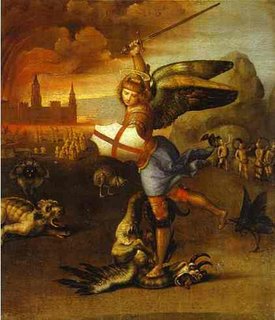 Michael (the name means "Who is like God?") is said to be the captain of the heavenly armies. He is mentioned in the Scriptures in Daniel 10:13,31; 12:1 (where he is said to be the prince of the people of Israel); in Jude 9 (where he is said to have disputed with the devil about the body of Moses); and in Revelation 12:7 (where he is said to have led the heavenly armies against those of the great dragon). He is generally pictured in full armor, carrying a lance, and with his foot on the neck of a dragon. (Pictures of the Martyr George are often similar, but only Michael has wings.)
Michael (the name means "Who is like God?") is said to be the captain of the heavenly armies. He is mentioned in the Scriptures in Daniel 10:13,31; 12:1 (where he is said to be the prince of the people of Israel); in Jude 9 (where he is said to have disputed with the devil about the body of Moses); and in Revelation 12:7 (where he is said to have led the heavenly armies against those of the great dragon). He is generally pictured in full armor, carrying a lance, and with his foot on the neck of a dragon. (Pictures of the Martyr George are often similar, but only Michael has wings.)
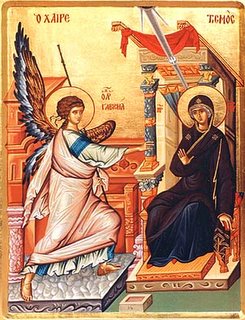 Gabriel (the name means "God is my champion") is thought of as the special bearer of messages from God to men. He appears in Daniel 8:16; 9:21 as an explainer of some of Daniel's visions. According to the first chapter of Luke, he announced the forthcoming births of John the Baptist and of our Lord to Zachariah and the Virgin Mary respectively.
Gabriel (the name means "God is my champion") is thought of as the special bearer of messages from God to men. He appears in Daniel 8:16; 9:21 as an explainer of some of Daniel's visions. According to the first chapter of Luke, he announced the forthcoming births of John the Baptist and of our Lord to Zachariah and the Virgin Mary respectively.
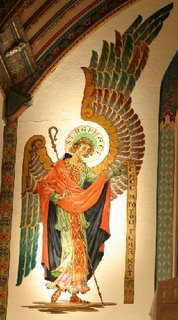 Raphael (the name means "God heals") is mentioned in the Apocrypha, in the book of Tobit, where, disguised as a man, he accompanies the young man Tobias on a quest, enables him to accomplish it, and gives him a remedy for the blindness of his aged father.
Raphael (the name means "God heals") is mentioned in the Apocrypha, in the book of Tobit, where, disguised as a man, he accompanies the young man Tobias on a quest, enables him to accomplish it, and gives him a remedy for the blindness of his aged father.
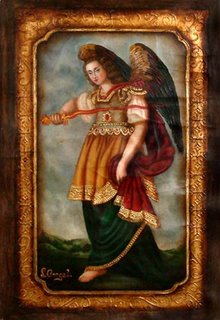 Uriel (the name means "God is my light" -- compare with "Uriah", which means "the LORD is my light") is mentioned in 4 Esdras.
Uriel (the name means "God is my light" -- compare with "Uriah", which means "the LORD is my light") is mentioned in 4 Esdras.
It is thought by many scholars that the seven lamps of Revelation 4:5 are an image suggested by (among many other things) the idea of seven archangels.
What is the value to us of remembering the Holy Angels? Well, since they appear to excel us in both knowledge and power, they remind us that, even among created things, we humans are not the top of the heap. Since it is the common belief that demons are angels who have chosen to disobey God and to be His enemies rather than His willing servants, they remind us that the higher we are the lower we can fall. The greater our natural gifts and talents, the greater the damage if we turn them to bad ends. The more we have been given, the more will be expected of us. And, in the picture of God sending His angels to help and defend us, we are reminded that apparently God, instead of doing good things directly, often prefers to do them through His willing servants, enabling those who have received His love to show their love for one another.
Everything You Never Wanted to Know about Angels
The major post-New-Testament source for Christian ideas about angels is a writer (probably a fifth-century Syrian monk) who signed himself "Dionysius the Areopagite." His writings were taken to be those of a convert of the Apostle Paul, mentioned in Acts 17:34. Accordingly, when he wrote on angels (or any other theological subject), he was assumed to know what he was talking about. His writings had a considerable influence on the portrayal of angels in art and in the popular imagination.
What is a seraph?
Seraphim are mentioned in the Bible in Isaiah's vision of the heavenly throne-room (Is 6:1-7), where the LORD is seated between two seraphim. (In Hebrew, most masculine nouns form the plural by adding "-im".) Each has six wings, and with two he covers his face, and with two he covers his feet, and with two he flies. Later writers identify these functions with poverty, chastity, and obedience. Poverty, in that he veils his face, a sign of humility. Chastity, in that he covers his feet, a standard Hebrew idiom (or euphemism) for the lower body, including the crotch. Obedience, in that he flies to carry out whatever commission he receives from God. The word "seraph" comes from a root meaning "to burn", and the word is used in Nu 21:6,8; Dt 8:15; Is 14:29; 30:6; where it is translated "fiery serpent." Probably the Hebrews pictured a seraph as a kind of fiery winged serpent or reptile.
What is a Cherub?
Cherubim are first mentioned in the Bible in Gen 3:24, where Adam and Eve are expelled from the Garden, and two cherubim are set at the gate to guard it, so that no one may enter. The Psalmist says of God:
He rode upon a cherub, and did fly; he came flying on the wings of the wind. (18:10)
thou that dwellest between the cherubim (80:1)
he sitteth between the cherubim; let the earth quake (99:1)
From this we infer that they were pictured and thought of as winged creatures flanking or supporting the throne of God.
Ancient Middle Eastern art regularly shows the throne of a king or a god flanked by, or sometimes resting on, two creatures. Typically, each creature has the body of a lion or a bull (often the front quarters of a lion, with claws, and the hind quarters of a bull, with hooves, or vice versa), the head of a man, and the wings of an eagle. We see these creatures, not only flanking a throne, but also flanking the gate or doorway of a city or a temple. They appear to be standard figures, performing the function of honor guards or that of guard dogs.
In Ex 25f and 36f, the Israelites are to make a chest called the Ark of the Covenant, and place on the lid statues of two cherubim, with their wings arching over and meeting in the middle. Aside from the fact that they had wings, we are not told anything about their appearance. It was apparently taken for granted that the Israelites already knew what a cherub was supposed to look like. It is a reasonable guess that they looked like the guard figures already standard in Middle Eastern art, as noted above.
The Ark represented the presence of God, and presumably the Israelites thought of the cherubim as guarding or flanking or supporting an invisible throne. Thus, the Ark gave two complementary messages. On the one hand, it said, "The LORD cannot be represented by a picture or statue. He is spirit, He is invisible. He is transcendant. The whole universe cannot contain Him." On the other hand, it said, "Here is the place where the LORD chooses to reveal Himself. This is the place toward which you are to direct your homage, this is the focus of your worship."
The prophet Ezekiel records two visions (Ez 1 and 10) in which the LORD appears to him, enthroned above four figures identified as cherubs. Each is said to have four faces, one facing in each direction, the face of a man, a lion, a bull, and an eagle.
Wednesday, September 27, 2006
Maybe I'm a little over-confident...but
So, here they are.

Advent Stole, Behold, the Lamb of God who takes away the sin of the world! The star that guided the wise men to the Christ.
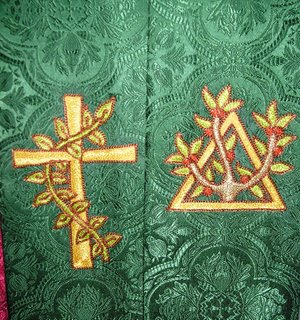
The vine that comes from the Branch of the Cross, new growth and the fruits of faith that comes from our baptism and the name of the Triune God.
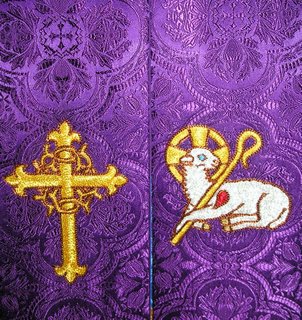
The suffering and humiliation of Christ's Passion, a Lamb before the slaughter. I really like the parallel between this stole and the advent stole.
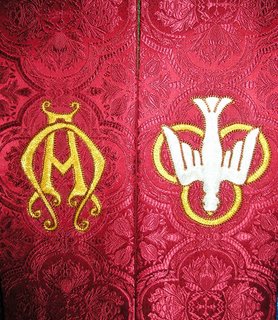
The Beginning and the End, the Holy Spirit descending in the symbol of the Trinity.
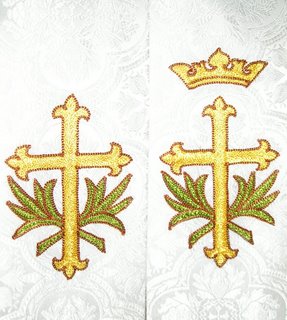
I like these two almost mirror images. The right cross is for the new-born Christ, with His Passion and Resurrection before Him, the left cross signifies His Easter Triumph over death, the devil and the grave.
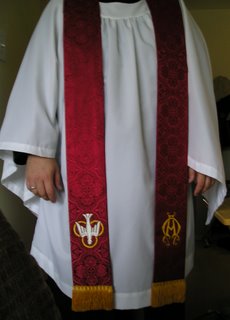
Front view of the red stole.
Tuesday, September 26, 2006
An Insider's Look at the Peaceable Religion of Islam
I found it very enlightening and frightening. Let us pray, as worshippers of the cross and Jesus, the Christ who gave His holy life that we might live on that cross, that God would melt the wicked hearts of stone of these enemies of the true, Triune God.
I am a Missouri Synod Lutheran chaplain. I have been on Active duty almost continuously since May of '04, first in Baghdad, then New Orleans, and now back in Baghdad (with a few months off for good behavior). Before that I was a dual parish pastor in Kansas for seven years, and before that for a dual parish in Nebraska for over 16 years.
I can footnote many of the comments I made, although I did not bring my library of books with me that contains some of the information that shaped my critique. However, I can assure you, that if a Muslim reads what I wrote, you can expect passionate denial or scorching invective. The denial may be honest, because many Muslims are as knowledgeable about Islam as many Christians are about Christianity. Also, since most cannot read the Koran (it must be read in Arabic to be authentic), they must rely on what their imams or mullahs tell them. On the other hand, the denial may be just another example of what I mentioned in my response: that a Muslim can look you in the eye and lie or twist what is true and think nothing of it.
I won't speak for the Jews here, but I can assert unequivocally that Muslims do, by and large, claim that Muslims and Christians worship the same god. I am in Iraq, where I rub elbows with Muslims. Spent some time in Jordan also . I have read hundreds of pages of Muslim propaganda and dogma. Almost every Muslim with whom I have a lengthy and serious discussion will bring up "how close we Muslims and you Christians really are in what we believe about God." One of their claims for authenticity and respect is just that they are just another brand of Abrahamic faith, chips off the same monotheistic block.
Popes, presidents, reporters, and politicians have bought that sale of goods in the interest of fostering good will with a religion that has pledged the destruction of all that which these new found friends of Islam hold dear. I suspect that many Muslims laugh in their sleeves at how gullible politically correct westerners are. One thing is for sure. In Islamic dogma it is not only permissible, but advisable, to lie to the "dogs" who desecrate Allah's world and dishonor Allah's faithful followers. So, they can look you in the eye, say with a straight face, "Allah and Jehovah are just two names for the same merciful and compassionate Lord," and "Islam means you no harm. Instead, we bring a fresh choice for world peace."
Mohammed, in the grand tradition of Joseph Smith, Mary Baker Eddy, Judge Rutherford, and, my favorite, L. Ron Hubbard, invented his "god" and theology out of scrap parts he found in theological junk yards. There is money to be made hawking "the better life," as his Allah sanctioned raids on helpless villages and caravans later proved. After all, who can argue with a bank robber and rapist whom God has certified as a faithful servant and confidant? Of course, to appeal to a somewhat Christian audience, one must incorporate just enough Jesus and Bible lingo and pious sounding schmooze to be minimally attractive. The historical records about Mohammed show that he tried a rapprochement with [heretical, no less] Nestorian Christians, using that canard about "we all worship the same, one, true God." In cosmic irony, they threw him out as a heretic (hence future surahs from "God" would revoke (abrogate is the word they use) his earlier benign tolerance of Christians.) Islam is, in my professional judgment, and shared by many, a Christian heresy, along the lines of Arianism: jam the "desirable" aspects of Christianity through a meat grinder, along with heavenly sounding spices and some "high-fallutin'" philosophical fillers to make sausage that is neither Christian nor honest.
By the way, "Allah" was a junior god in the Arab pantheon, one of many gods Mohammed and his family worshipped until he saw how the worship of one god had apparently unified the west (he was not a good historian either). Allah was his particular favorite. (Fun fact: Allah had two daughters that Mohammed almost entirely removed from his "revelations" from Allah, that did, however survive in the infamous "Satanic Verses.") The rest of the family didn't appreciate his rejection of their favorite gods, nor his goofy half-baked theory of monotheism, so they threw him out on his ear (which then led "God" to reveal some surahs to Mohammed in the Medinan exile to curse those idol worshipping miscreants of Mecca and doom them to the typical Muslim "peace" process.)
Also, Muslims like to use the old "King James Bible Trick" when you quote the Koran. If you say, "The Koran says such and such," they will always categorically, and again, with a straight face, say that it does not. Only a few might explain. "Allah didn't speak English." (That corresponds to, "If it ain't in the King James Bible or said with King James thee's and thou's, it ain't authentic."). So, the only way you can say that the Koran says this or that is if you actually use Arabic vocables.
But even then you are not home free, because the interpretation of the Koran is fraught with many grammar and document errors (which, again, a Muslim will categorically deny is possible,) that has resulted down through the years in some entertaining or confusing interpretation possibilities.
Then, just to make things fun in a debate, if you get across the first two moats, most Muslims will be quick to point you to passages in the "Meccan" surahs, which are, indeed, irenic, while downplaying the strident "Medinan" surahs about cutting necks and other acts of brutal public service performed on behalf of Allah, the merciful and compassionate, on folks that don't see things his way--much like the "modernist" liberal Christian crowd downplays "embarrassing" portions of Scriptures, such as Jehovah commanding Joshua to slaughter the Palestinians--man, woman and child, or the sayings "attributed" to Jesus that denounce Jews, or Paul denouncing homosexuality.
Then, just when it seems you are making headway, it turns out that the Koran isn't what drives most of Muslim faith and life anyways (which reads about as well as the Book of Mormon), but rather the sayings of Mohammed (May He Rest In Peace.) That's a roller coaster ride that makes Cedar Pointe a schoolyard playground by comparison. In many ways, debating with a Muslim is as exhilarating as an afternoon with five Jehovah's Witnesses or following Alice through the looking glass!
Wednesday, September 20, 2006
Bottom line...there is only one true religion and Christ is at its center.
Tuesday, September 19, 2006
All things to all people…or a convenient excuse for questionable living?
So many times I have heard people who serve in the church use this quotation to endorse and support wildly differing and often questionable worship practices and lifestyles. If a culture places high value on a certain musical style, then let’s use that style in all of our hymns. If a certain culture “feels” threatened by vestments and clergy shirts, let's wear polos and khakis. If a certain culture is uncomfortable with Jesus’ ethnicity, let's change it, if I certain culture is uncomfortable with Jesus’ gender, why not change that too?
I wonder if maybe the real crux of Paul’s statement here is not a wholesale rejection of all Christian tradition and doctrine, but rather a joyful proclamation that Christ is the answer for all things. If you are weak, He is strong. Where you are sinful, He is righteous. Where you are lacking, He is sufficient. And it is His fullness, His righteousness, His obedience that becomes a part of us through His Word, His Sacraments, His Church. Remember, it was also that blessed Apostle and brother who said “for it is God who works in you to will and to act according to his good purpose.”
It is important, especially as pastors, to test your motives against the whole counsel of God. If you find yourself defensively throwing out the same scripture over and over again to defend your actions, it may be wise to examine your heart and turn in obedience to the will of God.
Monday, September 18, 2006
Religious Terrorism
"We tell the worshipper of the cross (the Pope) that you and the West will be defeated, as is the case in Iraq, Afghanistan, Chechnya" said a Web statement by the Mujahideen Shura Council, an umbrella group led by Iraq's branch of al Qaeda.
"We shall break the cross and spill the wine ... God will (help) Muslims to conquer Rome ... (May) God enable us to slit their throats, and make their money and descendants the bounty of the mujahideen," said the statement, posted on Sunday on an Internet site often used by al Qaeda and other militant groups.
Now is that violent or not? Christians must be ready for more accute and widespread violence and persecution as Muslim violence and hatred increases against us. Unfortunately, given previous comments on this very blog site, I fear we may also face persecution from militant Judaism.
May God help us and may this time of tribulation be short so that we, His elect, may survive!
Come, Lord Jesus!
Saturday, September 16, 2006
Bound in our Freedom.

God has given us freedom in Christ. That is a remarkable and wonderful gift. A gift that He gives freely and a gift that truly frees us. However, some would take that good gift and pervert it. Some would take the freedom we have in Christ and try to bind us with it, to make us slaves, no longer to the Law of God, but to the freedom He has given us!
How often is the plea made, “We have freedom in the Gospel”? How often is that plea made to justify some unusual practice in worship, or to promote the ordination of women, or the acceptance of a homosexual lifestyle? How often is that plea made with the intention of binding and alienating all detractors? “Our worship practice has implications for our doctrine and theology…” “WE HAVE FREEDOM!! in the gospel.” “God’s Word is very clear that women should not…” WE HAVE FREEDOM!...in the gospel.” “Homosexuality is clearly not…” “WE HAVE FREEDOM!”
Where’s the Gospel?
The next time you are shut down for being conservative, the next time you are made to feel like the devil for demanding faithfulness to God’s Word, the next time someone tries to bind you with some alien freedom, remember this, “For though I am free from all, I have made myself a servant to all…” (I Cor. 9:19a)
Thursday, September 07, 2006
UPDATED POST
I thought it would be good to illustrate a way in which the use of artwork, especially iconography, can be beneficial in Lutheran devotional life.
Also, always consider art in your churches. There will be times when, as hard as it may be to believe, the pastor will have a boring, or even bad sermon. It is at these times godly and scriptural art can redirect the sinful man to focus on Christ, the Word made flesh. If you see something in your church that you don't understand, ask someone about it! This includes all vestments, paraments, banners, symbols and colors on said vestments, paraments and banners, and even bulletin covers and Hymnal covers (the LSB has a beautiful and subtle reminder of Word and Sacrament as well as the mystery of the Trinity!)
Another Golden Aardie
Wednesday, September 06, 2006
Jesus Alone? Sounds good, right? Maybe not...
Stephen Prothero, American Jesus: How the Son of God Became a National Icon. Page 79.
This is a brief excerpt from a book I am reading for Christology. I haven’t had the class yet, but I could not wait to read this intriguing book. What is so interesting about the above excerpt is the total disconnect between the Word and the Incarnate Word. This is something liberals like to do, divorcing Jesus from Himself by denying the power and authority of the Word.
John 1:1-5
Tuesday, September 05, 2006
Why can't we all just...

“Why can’t we just get along?”
An alluring question, isn’t it? A question that always seems to be asked in times of conflict. A question that is asked by people who are willing to go to great lengths to have a form a peace. A question that was on the marquee of a United Church of Christ in Des Peres, Missouri.
I saw this sign on the way to work last week. Now, in general, I’m not a big fan of those cutesy signs. I usually think they are pretty corny and more than a little pathetic. But this one was more than corny or pathetic; it was totally revolting to me.
Why is that? I don’t think the Holy, Catholic Church of Christ should ever ask such a simplistic and, frankly, retarded question. There is a reason we can’t all get along, that reason is truth. Christ is the Truth. When we are confronted, as Christians, with anything that opposes Christ, i.e., Islam, Judaism, Hinduism, or the UCC, we cannot get along. We are sanctified only in the Incarnate Word of Truth and when presented with anything other than that holy and life-giving Word, there is no unity and no “getting along.”
So what is the answer to “why can’t we all just get along?” Because we are not all in Christ, because we are all sinful, because the time for that has not come. We cannot all get along because there is great evil in the world and that evil sets itself against Christ and His Church.
New Icon
Today I got a new one that I ordered from e-Bay. It is called "deisis." Deisis is from the Greek for prayer, as is described below. When I look and meditate upon the beauty of this man-made work of art, it makes me think of the faithfulness of Christ's holy servants, the Blessed Virgin and St. John, Baptizer and Forerunner.
The Origins of This Image
One of the most important architectural features of Orthodox churches is a screen called the iconostasis (accent on the third syllable) that separates the sanctuary, where the altar is located, from the congregation in the nave. This screen consists of several horizontal rows of icons. In early Byzantine times, the iconostasis consisted of a single panel or sometimes a triptych of the Savior, the Virgin Mary, and John the Baptist called the Deisis. The word in Greek means "prayer," and is pronounced "dee’-sis." By the 13th century in Russia, many more icons were added but the Deisis remained the centerpiece.
This icon we have reproduced for you is from an ancient Byzantine pattern, probably at least 1400 years old, dating from a time in which it would have been the focal point for the eyes of worshipers during the Eucharistic Sacrifice, providing for them a visual counterpart to the sacred scripture: "This is my body, given up for you."
Theology and Symbolism
Christ is seated on His heavenly throne, right hand raised in benediction and left hand resting on the Bible, open to the words (in Greek) from the Gospel of John, "I am the way, the truth, and the life." (John 14:6) He is dressed in a tunic of red, signifying His humanity and His blood shed for us. Over the tunic He wears a robe or hymation of blue, signifying His divinity with the blue of Heaven. Christ’s halo, the iconographic symbol for sanctity, is inscribed with a cross and the Greek letters omicron, omega, nu, spelling "HO ON." In English, this becomes "Who Am," the name used for God in Exodus 3:14.
Mary wears a homophorion, or combined veil and mantle over her dress. It is adorned with three stars on the head and shoulders. These are symbolic of Mary’s perpetual virginity; before, during, and after her Son’s birth. In 431 AD, the Council of Ephesus officially declared that Mary is the Theotokos, or "God Bearer," she who provides the vital link between the divinity of God and humanity. Her pose in this icon with head inclined toward Jesus and hands extended communicates of submission to Christ and directing other to look only to Christ, her divine Son.
John the Baptist is usually referred to by Orthodox Christians as John the Forerunner. In iconography, he is always represented with long, unkempt hair in keeping with his life in the wilderness. Sometimes he is dressed in hairy garments with a leather belt as in Matthew 3:4, and sometimes in classical robes as in this image. John is included in the Deisis because of his role foretold in Isaiah 40:3, "A voice cries out: In the wilderness prepare the way of the Lord." Like Mary, his pose is one of prayerful supplication.
Above the figures are abbreviated inscriptions in Greek that name each person. The letters above Mary stand for Meter Theou, Mother of God, those above Jesus represent Iesous Khristos, Jesus Christ, and the letters above John translate as "St. John the Forerunner."
icon explanation from http://www.printeryhouse.org/mall/Icons/Saints/m01.asp
Back to School

Ok, it's finally here. My last first day of school! For 21 (23 if you count preschool!) years I have had a "first day of school."
I don't know if you got jitters in your stomach on the first day, but I always did and still do. You'd think I'd be used to this by now, but it still makes me nervous. Do I have everything I need? Will the teachers be nice? Will my classmates be nice? Will I do well?
In times like this, Jesus' words always bring me comfort, "Therefore I tell you, do not worry about your life, what you will eat or drink; or about your body, what you will wear. Is not life more important than food, and the body more important than clothes? Look at the birds of the air; they do not sow or reap or store away in barns, and yet your heavenly Father feeds them. Are you not much more valuable than they? Who of you by worrying can add a single hour to his life?
"And why do you worry about clothes? See how the lilies of the field grow. They do not labor or spin. Yet I tell you that not even Solomon in all his splendor was dressed like one of these. If that is how God clothes the grass of the field, which is here today and tomorrow is thrown into the fire, will he not much more clothe you, O you of little faith? So do not worry, saying, 'What shall we eat?' or 'What shall we drink?' or 'What shall we wear?' For the pagans run after all these things, and your heavenly Father knows that you need them. But seek first his kingdom and his righteousness, and all these things will be given to you as well. Therefore do not worry about tomorrow, for tomorrow will worry about itself. Each day has enough trouble of its own. (Matthew 6:25-34)
The Apostle Paul's exhortation to "not be anxious about anything, but in everything, by prayer and petition, with thanksgiving, present your requests to God." (Philippians 4:6) also eases my soul.
God's Word is beautiful!
